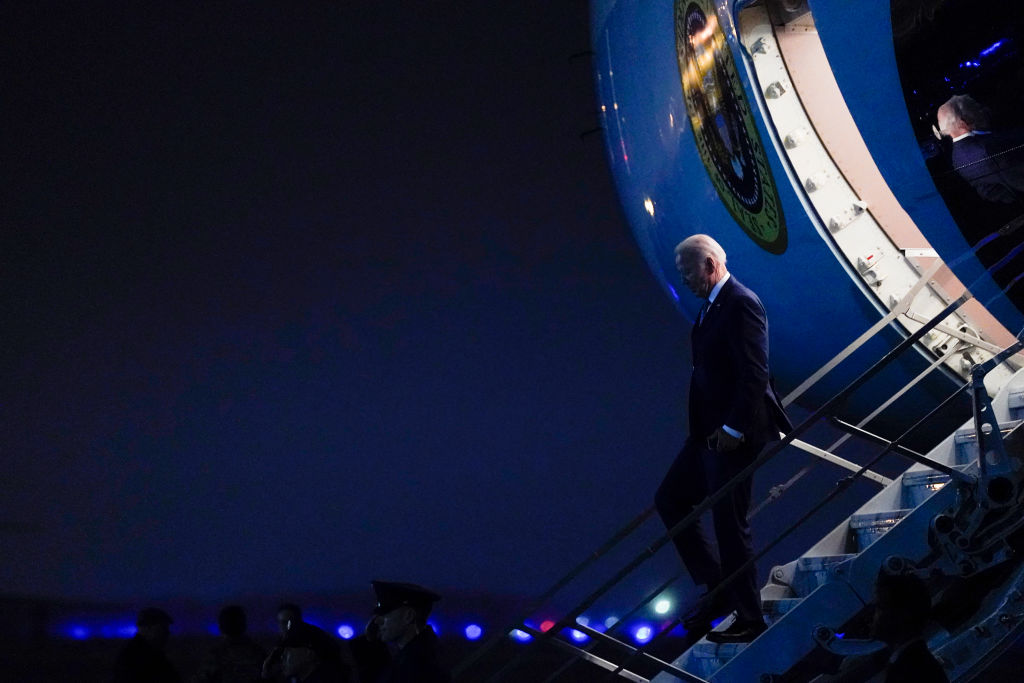When a drone strike from an Iran-backed militia killed three U.S. servicemembers and wounded at least 25 others in Jordan on January 28, pressure grew considerably for the White House to escalate U.S. military involvement in the conflict in the Middle East.
While President Joe Biden and his foreign policy team have been broadcasting their commitment to preventing a widening of the war for months, the war has, indeed, been widening. And the first U.S. fatalities could be a game changer.
[time-brightcove not-tgx=”true”]
In a tough election year, Biden will now be considering military options that go beyond the strikes against the Houthis in Yemen. But the president also needs to beware of the consequences: In the current political environment, the electoral costs of escalating a war would likely be far greater than the costs of avoiding one.
Read More: How Biden May Respond to the Drone Attack That Killed 3 U.S. Servicemen
A new YouGov poll released on January 25 shows that 23% of Biden’s 2020 supporters would hold the President responsible if gasoline prices were to rise to $5 a gallon or more, because of a widening war in the Middle East. Overall, a 52% majority of respondents held the same view. And 71% agreed that such an increase in gas prices, owing to an expanded war, could affect the outcome of the presidential election in November.
These figures are reflective of a bigger overall trend: voters today have little appetite for U.S. involvement in military conflicts overseas and strongly reject domestic price increases that result from foreign policy decisions.
The nearly one-quarter of 2020 Biden voters who would hold the President responsible for a large increase in gas prices could easily make the difference in a close election. If we look at the election of 2020, for example, just a very small fraction—about 1 in 20—of this contingent of Biden voters could tip the election to Trump, if their disapproval were enough to keep them from voting. And this is a conservative estimation, because we are only looking at voters who would express their discontent by staying home. Some would likely switch to Trump, and therefore have twice as much impact on the outcome as those who abstain.
A substantial increase in gas prices would be a likely consequence of an expanded war. Since the start of the war in Gaza, prominent Republicans, including Lindsay Graham, have been calling for the President to bomb Iranian oil refineries. This would be a boon to GOP electoral prospects.
If Biden truly wants to prevent the spread of war in the Middle East—and, in turn, prevent the election of Donald Trump—then he needs to use the considerable leverage that he has to bring about a ceasefire in Gaza. As long as the war in Gaza continues, the danger of an escalating conflict continues to rise.
It’s now been more than three months since the Hamas attack on Israel took 1,140 Israeli lives and several hundred hostages. The Israeli bombardment of Gaza has now taken more than 26,000 Palestinian lives. Most of them are innocent civilians, including children and women. This does not count many thousands who have died from lack of medical care and public health breakdowns due to the bombardment and siege.
Whatever the motivations of Iran and allied regional militias, it is clear that they have been launching attacks in response to Gaza. During the six-day ceasefire between Israel and Hamas in November, attacks by militias on American troops largely stopped. A ceasefire between Israel and Hamas would stop or substantially diminish the strikes on Red Sea shipping and US military installations.
It’s in the President’s interest to make this happen, given his enormous influence. Israeli Prime Minister Benjamin Netanyahu has relied on the Biden Administration for thousands of tons of munitions, as well as vetoes at the UN Security Council. This is also not unprecedented: President Ronald Reagan was able to convince Israeli Prime Minister Menachem Begin to stop the bombardment of Lebanon in 1982 by expressing his “outrage” at “needless destruction and bloodshed” and withholding the transfer of cluster munitions.
It’s time for President Biden to use his leverage to bring about a ceasefire. This could save thousands of lives and prevent an expanded regional war. It could very well save his presidency, too.

